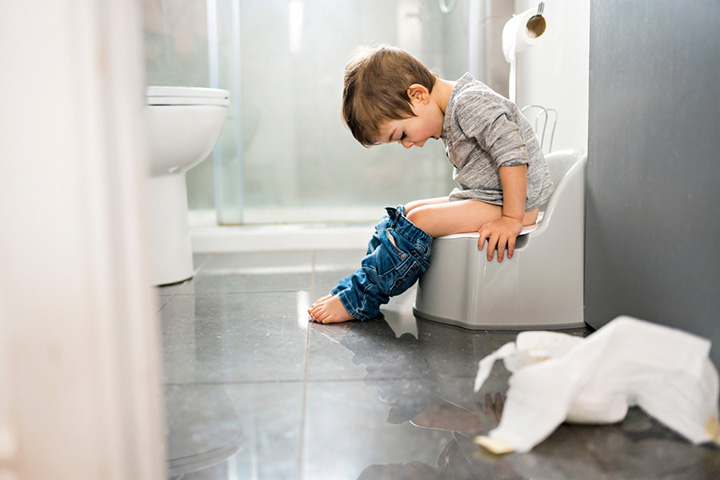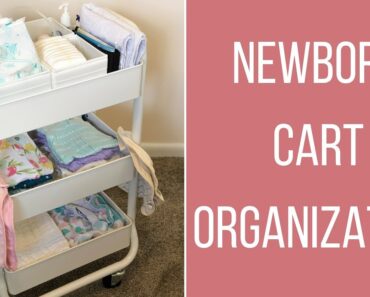Image: Shutterstock
It is common for toddlers to withhold poop by not passing stool. There may be psychological or physical factors behind a toddler withholding poop. It is essential to resolve it in time to avoid other health problems. Understanding the causes can help parents tackle the issue appropriately.
In this post, we tell you the signs and possible causes of a toddler withholding poop and ways to encourage the little one to pass stool and maintain healthy bowel movements.
Signs Of A Toddler Withholding Poop
The most notable sign is your toddler not passing stool for a few days. They may also show the following signs often suggestive of controlling the urge to pass stool (1) (2).
- Display more gassiness than usual
- Reduced appetite
- Make their body stiff
- Straighten their legs
- Cross their legs
- Clench the buttocks
- Stand on their toes
- Appear like they are straining as their face may turn red
- Some toddlers may display urine incontinence (urine leakage)
Why Do Toddlers Withhold Poop?
The following are the common reasons for toddlers to withhold stool.
1. Constipation
Constipation is usually the most common reason for toddlers to withhold poop (1). Toddlers with constipation have hard, dry, and difficult-to-pass stools, which are difficult to pass. It may cause the toddler to prefer withholding the poop, worsening constipation.
2. Fear of bad experiences
A toddler might have some fear of using the toilet due to previous bad experiences. An intimidating experience, such as being ridiculed for an accident by a classmate or sibling, might prevent them from pooping, especially at the place where the accident occurred.
At times, the location of the toilet or embarrassment due to the loud sound of the toilet flush may make the child withhold their poop (3).
3. Uncertain about their potty training
Many toddlers have a smooth transition from diapers to the potty seat for peeing but may have problems with pooping out of diapers. They may resist pooping on the toilet seat, leading to the withholding of stool.
4. Independence and control issues
Toddlers develop a habit of asserting independence. They begin to refuse what their parents ask them to do and have a strong power struggle issue. Thus, when parents ask them to poop on the potty seat, they may refuse and withhold poop as they do not want to give in.
5. Engrossed in playing
Toddlers often do not like to spend their time in any other activity other than playing. They may rather spend time playing than visit the toilet. It leads to withholding of poop, becoming a habit eventually.
6. Sensory or anxiety issues
Some toddlers with sensory processing disorders may not like the feeling of pooping. They might be overly sensitive to the smell and appearance of poop (4). In such cases, the toddler may resist going to the toilet for days together despite visible discomfort due to a full bowel.
7. Health problems
Several health issues may cause a toddler to withhold poop deliberately or involuntarily. Most health problems cause other signs and symptoms likely to be more noticeable than withholding poop (5) (6) (7).
The following conditions may interfere with the ability to poop, causing the toddler to withhold poop voluntarily or involuntarily (8) (9) (10) (11).
- Celiac disease
- Hirschsprung disease
- Irritable bowel syndrome
- Fecal impaction
- Colonic inertia
- Hypothyroidism
- Pelvic floor dysfunction
Complications Of Withholding Poop
It is essential to resolve the problem of withholding poop since it may lead to the following complications (12)(13).
- Stomach pain
- Flatulence
- Abdominal cramping
- Abdominal distension
- Harder stools that are significantly difficult to pass
- Urinary incontinence
- Urinary tract infections
How To Get A Toddler To Poop?
Parents may try the following steps to help the toddler achieve healthy bowel movements (1).
1. Try simple strategies
You may try a strategy that works best for your toddler. A warm bath, a warm glass of milk, or a simple exercise before going to the toilet could work and make the toddler pass stool easily.
2. Choose the correct potty seat
Choose the right-sized potty seat for your toddler. Make sure their feet touch the floor, so they are not scared of falling off. The potty seat should be stable and not shaky so that the toddler isn’t frightened.
3. Educate the toddler
Positive reinforcement is essential and effective. According to the toddler’s age and maturity, explain how the food we eat from the mouth has to leave the body as poop. Get them some books that are available for children being potty trained. Answer their queries and do not use words or expressions that define poop as something gross. Tell them it is a natural process and reinforce it through your words and actions.
4. Change the diet
Consumption of highly processed food items void of fiber can cause constipation in toddlers. Fiber-rich foods, such as whole grains, leafy greens, and fruits, add bulk to the stools, making it easier to pass them. If your toddler has a health condition that restricts the type of food they can eat, speak to a pediatric nutritionist who may suggest an appropriate diet plan.
5. Ensure adequate hydration
A fiber-rich diet with insufficient hydration may make a child’s constipation worse. Make sure the toddler drinks ample fluids. In addition to water, they may consume homemade soups, broths, and smoothies made from fresh fruits and vegetables.
6. Improve activity levels
Toddlers with a sedentary lifestyle may be more susceptible to constipation and poor bowel movements. Encourage your toddler to indulge in physical activities and games. Aerobic and muscle-strengthening activities are great at improving the health and motility of the digestive tract.
7. Schedule poop breaks
If your toddler resists pooping, fix a schedule where you take the toddler to poop at the same time each day. It will help establish a poop routine, causing the toddler to feel the urge to go to the toilet at the same time each day. It could make the toddler stop withholding poop eventually.
When To See A Doctor?
If dietary changes, lifestyle modifications, and positive reinforcement do not help, you may contact the child’s pediatrician. The doctor may look for the underlying cause, such as a health problem or psychological issue, and suggest relevant treatment or management strategies.
Toddlers withholding poop is common, and constipation is often the underlying cause. Parents can adopt simple strategies and make helpful lifestyle changes to make it easier for a toddler to poop. Try to understand the underlying cause and address it. Your pediatrician can also guide you on how to inculcate healthy bowel habits in toddlers.


































